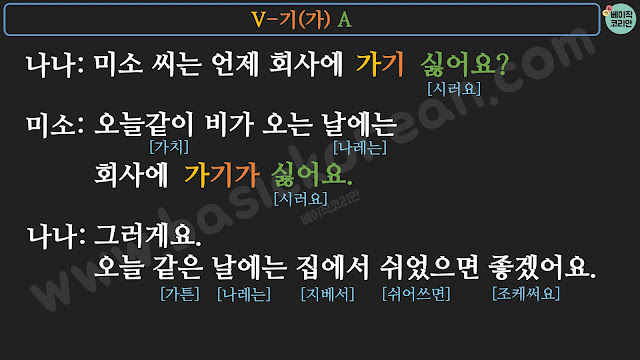Learn Korean: Korean Grammar 108: V-기가 A
In this lesson, we're going to learn 'V-기가 A '
🎬 Korean Grammar108: https://youtu.be/0LUxJWBNvPY
1. A short conversation & Pronunciation
- 나나: 미소 씨는 언제 회사에 가기 싫어요?
(Miso, when do you not want to go to work?)
(Miso, when do you not want to go to work?)
- 미소: 오늘같이 비가 오는 날에는 회사에 가기가 싫어요.
(I hate going to work on rainy days like today.)
(I hate going to work on rainy days like today.)
- 나나: 그러게요. 오늘 같은 날에는 집에서 쉬었으면 좋겠어요.
(I know. I wish I could rest at home on a day like today.)
(I know. I wish I could rest at home on a day like today.)
→ The grammar we're going to learn today is '가기 싫어요? and 가기가 싫어요.' Let's find out today's grammar.
2. Usage
► '기(가) A' attaches after a verb stem.
► 기 + 가 + adjective: It is an expression that combines the ending '기' which turns a verb into a noun, and '가' which is a particle that attaches after a noun, and an adjective.
- 'Verb-기 ' is played a role as a noun. And the particle '가' can be omitted.
► And the adjectives that follow often include '쉽다 (easy), 어렵다 (difficult),
좋다 (good), 싫다 (hate), 나쁘다 (bad), 편하다 (comfortable), 불편하다 (uncomfortable), 힘들다 (hard)'.
► It is used when talking about an action tends to be 'adjective - easy, difficult, good, bad.'
3. Example Sentences
▶ 회사에 가기가 싫어요.
▶ 회사에 가기가 싫어요.
= 회사에 가기 싫어요. (가다 + 기가 + 싫다)
(I hate going to work.)
(I hate going to work.)
- '가기(가) 싫어요' is a combination of the verb '가다' and '기(가) and the adjective '싫다.'
- It means 'I go to work.' I hate that.
- It means 'I go to work.' I hate that.
 |
| V-기(가) A |
▶ 샐러드를 먹기가 싫어요.
= 샐러드를 먹기 싫어요. (먹다 + 기가 + 싫다)
(I hate to eat salad.)
(I hate to eat salad.)
- '먹기(가) 싫어요' is a combination of the verb '먹다' and '기(가) and the adjective '싫다.'
- It means 'I eat salad. I hate that.'
 |
| V-기(가) A |
4. Combination Information
- Whether a verb stem has the final consonant or not,'기(가) adjective' is used
- Verb | Final Consonant O & X: -기(가) A
- Final Consonant O: 먹다 + 기(가) A → 먹기(가) A
- Final Consonant X: 가다 + 기(가) A → 오기(가) A
5. Practice
- 다리가 아파서 걷기가 힘들어요. (걷다 + 기가 힘들다)
(It's hard to walk because my leg hurts.)
(It's hard to walk because my leg hurts.)
- 집이 가까워서 회사를 다니기가 좋아요. (다니다 + 기가 좋다)
(It is good to go to work because my house is close to it.)
(It is good to go to work because my house is close to it.)
- 한국은 대중교통을 이용하기가 편해요. (이용하다 + 기가 편하다)
(It's easy to use public transportation in Korea.)
(It's easy to use public transportation in Korea.)
(A short conversation & Pronunciation)
- 미소: 나나 씨, 한국에서 살기가 어때요?
(Nana, how about living in Korea?)
(Nana, how about living in Korea?)
- 나나: 처음에는 한국에 적응하기가 힘들었는데 지금은 많이 편해졌어요.
(At first, it was hard to get used to Korea, but I'm much more comfortable now.)
(At first, it was hard to get used to Korea, but I'm much more comfortable now.)
- 미소: 뭐가 제일 힘들었어요?
(What was the hardest part?)
(What was the hardest part?)
- 나나: 한국어를 배우기가 정말 어려웠어요.
(It was really difficult to learn Korean.)
(It was really difficult to learn Korean.)
→ 살기가 어때요? (살다 + 기가 어렵다)
→ 적응하기가 힘들었는데 (적응하다 + 기가 힘들다 + 었는데)
→ 배우기가 어려웠어요 (배우다 + 기가 어렵다)
Thank you~!
#베이직코리안 #한국어문법 #Basickorean #Koreangrammar





_basickorean.jpg)
